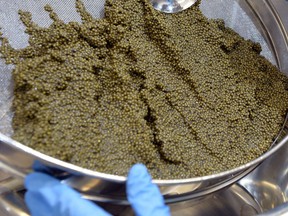Opinion: New investigation in B.C. alleges disturbing practices in “sustainable” caviar industry.

Article content
Caviar is synonymous with culinary luxury. For consumers willing to pay the price, it offers a moment of rich and salty decadence. For the animals farmed to produce it, though, the cost is much higher.
Advertisement 2
Article content
For what appears to be the first time, undercover footage appears to reveal alleged cruelty and conditions far from lavish in the Canadian caviar industry.
Article content
In the early 2000s, the global caviar industry underwent substantial change. The UN banned nearly a dozen countries in 2006 from exporting the product from wild beluga sturgeon in order to protect the endangered species, which followed a 2005 U.S. ban on the product.
In 2022, the U.S. Fish and Wildlife Service then proposed to list four species of sturgeon — Russian, Persian, ship and stellate sturgeon — as endangered under the Endangered Species Act.
“All four species, once abundant in the wild, have declined by more than 80 per cent since the 1960s and no longer are sustaining themselves in the wild through natural reproduction,” the agency said in a statement. It adds that one of the primary threats to these species is “intensive fishing to fulfill demand for caviar.”
Article content
Advertisement 3
Article content
Over that time, farming fish to “sustainably” produce caviar has grown in popularity, with B.C.’s Northern Divine Aquafarms touted as North America’s first and only certified organic caviar farm, and the country’s only producer of farmed white sturgeon.
The on-land farm is now under investigation by the B.C. SPCA and Fisheries and Oceans Canada for alleged violations of provincial or federal animal cruelty laws.
Last month, Canadian animal law organization Animal Justice released hundreds of hours of undercover footage it says was gathered in November by a whistleblower at the Sunshine Coast fish farm, which also raises salmon.
It’s hard to watch. Fish are shown being stabbed in their abdomens to check for egg maturity, while workers use straws to suck eggs out of the fishes with their mouths. The footage also shows animals living in cramped and filthy conditions. A two-metre sturgeon named Gracie is alleged by Animal Justice to have been forced to swim in circles in a tiny tank for at least 25 years.
Advertisement 4
Article content
Of additional legal concern is released video showing fish being thrown on ice, killed by freezing to death, which is against industry guidelines. Some salmon appear to survive the slaughter process, which involves being bashed with a metal pipe, and are left thrashing on a bloody pile of ice.
According to a news release from last June, when the Canadian farm was purchased by a Florida-based company, the facility has 6,000 “caviar-ready” white sturgeon, as well as tens of thousands more in its nursery.
“Northern Divine is inflicting heartbreaking cruelty to fishes who are forced to live in crowded, barren tanks before being brutally killed — all to provide luxury caviar to the handful of wealthy consumers who can afford to eat it,” said lawyer and executive director of Animal Justice Camille Labchuk in a statement. “Fishes can’t scream, but that doesn’t mean they don’t suffer — they’re sentient animals who can feel pain, and deserve better than to spend their lives in cramped, dirty tanks.”
Advertisement 5
Article content
Indeed, the science is clear that fish are sentient, can feel pain and suffer when taken out of water. Work by renowned researcher Dr. Victoria Braithwaite suggests fish exhibit complex behaviours, memory and emotional responses akin to vertebrates, indicating sentience. They respond to noxious stimuli, implying the capacity to feel pain.
And yet culturally, torturing fish by hooking and ripping them from their habitats, and through other commercial fishing practices and aqua-farming, are generally accepted. Industries can do to fish what would be considered highly illegal and certainly immoral if done to dogs.
Animal Justice is calling for a total ban on caviar production in Canada. And as many Canadians are already struggling with mounting food costs, perhaps the time is right to cast this cruel and costly industry out to sea.
Advertisement 6
Article content
Jessica Scott-Reid is a Winnipeg-based journalist and animal advocate.
Recommended from Editorial
Bookmark our website and support our journalism: Don’t miss the news you need to know — add VancouverSun.com and TheProvince.com to your bookmarks and sign up for our newsletters here.
You can also support our journalism by becoming a digital subscriber: For just $14 a month, you can get unlimited access to The Vancouver Sun, The Province, National Post and 13 other Canadian news sites. Support us by subscribing today: The Vancouver Sun | The Province.
Article content
reference: theprovince.com


